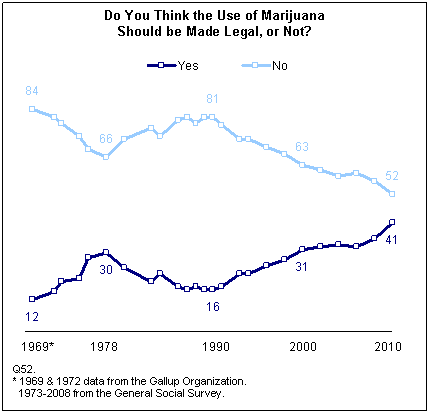It’s 4/20, brah. That means it’s time to breathe in some of the latest in the surging movement to decriminalize or legalize marijuana. All around the country, states and municipalities are considering measures that would ease restrictions on marijuana possession and use. Not only are some local governments pining for the revenue that could be realized from taxing pot purchases and the savings that could be realized from not having to police, prosecute, and jail people for partaking, but popular opinion has shifted radically over the last several years.
Pew:
This November, California could be the first state to legalize marijuana outright. Some polls indicate it stands a real chance of passing. Fourteen states have legalized the use of marijuana for medicinal purposes, including Montana and Alaska, which have tended to support more conservative politicians. The Obama administration is the first to order the Department of Justice to stop tampering in states that have legalized medicinal marijuana.
Even in supposedly ultra-conservative states, legislators and localities are considering moves to liberalize their marijuana laws.
In Arkansas, the cities of Eureka Springs and Fayetteville have effectively decriminalized simple possession when residents voted to instruct the police to make pursuit of these cases their lowest priority.
Texas, Alabama, and Mississippi are debating bills that would keep medicinal users from going to jail, though they probably don’t stand much chance of passage just yet.
Last year, even New Orleans, which has had one of the highest drug arrest rates in the country, took an important step when District Attorney Leon Cannizzaro pushed to move simple possession cases out of criminal court.
But right now, the state of Louisiana is heading in the opposite direction. The Legislature is taking action to criminalize synthetic marijuana-like products instead of examining the results of continued prohibition.
I have long thought that New Orleans would be a perfect city to test regulated legalization. It’s the type of town – with its tourism industry, music, and food – that could generate a ton of revenue from heavily taxed Mary Jane.


